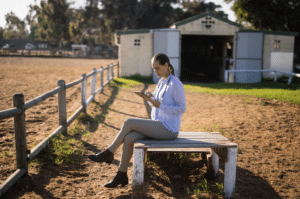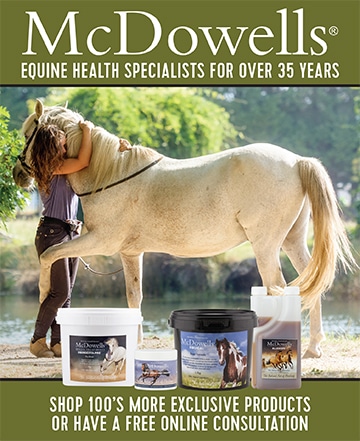
Whether you ride for leisure or compete at international levels, keeping a riding journal can bring many benefits to your riding and help strengthen the bond with your horse. Journaling encourages you to stay focused on what’s important to you and can help you set more realistic goals while staying positive along the way. We have compiled a few tips below to get you started on your new writing journey:
How to Get Started:

1. Setting Goals and Tracking Your Progress
It all starts with a specific idea of what you want to accomplish, and creating an action plan around it:
- Break down your goals into milestones and timelines: This will help you track your progress and visualize your end goal. For example, if your objective is to compete in 1-star Eventing by the end of the year, think about how to break it into smaller goals (per month, per week, and then per day) to uncover a concrete plan of action.
- Have a plan before each ride: Before each ride, go back and read your notes and remember what to focus on- what specific challenges you would like to address, and what exercises can help you overcome them. In addition, having a checklist of all the things you need before your lesson and a list of questions for your instructor can help set you up for a productive ride.
- Reflect after each ride: Take note of tips and tricks that have worked for you or that have helped you tackle challenges. What has worked? What hasn’t? What can you do to improve next time? What exercises should you focus on? Are there alternatives or variations of those exercises that can help you progress? Feel free to review your notes with your instructor and get their feedback. Make sure to keep track of new challenges along the way, whether they come from you or your horse. You can also do some homework and review resources, including online discussion groups, videos, or articles, to look for other ways to improve and overcome your challenges.
- Create new habits: Depending on the discipline and the horse you are riding, you can start to create patterns of exercises that work best for you (for example, a specific set of exercises to warm up for your dressage or jumping lesson).
Note: Don’t forget to track your horse’s physical and mental fitness throughout this journey as well. Paying close attention to how your horse is feeling is also a great way to understand him better and build a deeper connection.
2. Stay Consistent
Finishing a lesson on a good note and finding the sweet spot in connecting with your horse can bring a lot of joy and satisfaction, but it may be hard to pinpoint what you did right and remember it for next time unless you consciously make note of it. Staying consistent in writing down your notes after each lesson will be helpful in remembering the small details, sequence of exercises, as well as the different interactions with your horse. Ideally, you should make a habit of updating your journal as soon as you can after a ride- while you are still at the barn or shortly after getting home.
3. Celebrate the Wins and Cut Yourself (and Your Horse!) Some Slack:
Celebrating progress is important in keeping yourself motivated and excited along the way. When something positive has happened, make sure to write it down, even if it feels like a small step. Eventually, you will have bigger wins and more to celebrate!
While a riding journal makes you accountable for your own success, giving yourself some slack and remembering that not everything is always in your control is just as important. Just like you can have easier days than others, horses too have their own temperaments and can also have “bad” days. Remember to be thankful to your horse for this journey and give him the opportunity to learn and progress at his own pace. Ultimately, riding is a partnership and a team effort, where the well-being of all members is equally important for success!
What Resources to Use?

Some of us prefer putting real pen to paper, while others like everything to be digital. Whatever your method of choice, resources are available online to help you through this new journey. Some of our recommendations include:
The Equestrian Journal: https://www.theequestrianjournal.com/
Horse Write: www.horsewrite.com
Equus Note Digital Diary: https://www.equestrian.studio/
Happy journaling!


